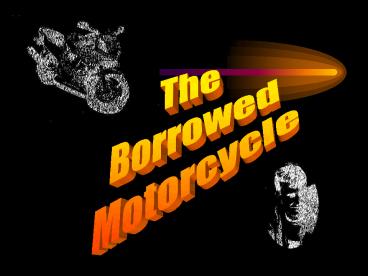P1246990944WIUNQ - PowerPoint PPT Presentation
1 / 38
Title:
P1246990944WIUNQ
Description:
Rides fast in a straight line. Doesn't follow PPE Rules. Experienced Military Rider ... Rider recognizes hazard, but does not have adequate space to stop or swerve ... – PowerPoint PPT presentation
Number of Views:48
Avg rating:3.0/5.0
Title: P1246990944WIUNQ
1
The Borrowed Motorcycle
2
Why do People Ride?
- ?
3
Why do people ride?
- Fun
- Image
- Friends
- Performance (power sport)
- Economy
- Fuel Economy
- Ease of Parking
4
Task I (Question 1)
- Could some groups be affected by an
Organizational Culture? - Fun
- Image
- Friends
- Performance (power sport) (street vs.. track)
- Economy
- Fuel Economy
- Ease of Parking
5
Task I (Question 2)
- Could this Cultural Organization affect risk
decisions? - Fun
- Image
- Friends
- Performance (power sport) (street vs.. track)
- Economy
- Fuel Economy
- Ease of Parking
6
What Research Shows
- The Motorcycle Rider is Vulnerable
A Riders Judgement is Critical
Being Seen Deters Accidents
Need for Rider Education
7
Administrative Controls
- License Endorsement / Vehicle Registration
Motorcycle Equipment Requirements
Protective Equipment
Insurance
Training (age)
Inspection
8
Military Controls
- License Endorsement / Vehicle Registration
Motorcycle Equipment Requirements
- Protective Equipment
- More Specific
Inspection Insurance
- Training
- Required for all riders
Base Decals
9
Task I (Question 3)
- What controls could affect the Cultural
Organization? - Fun
- Image
- Friends
- Performance (power sport) (street Vs. track)
- Economy
- Fuel Economy
- Ease of Parking
10
Training Goals
- Decrease probability of a crash occurring at all.
Reduce the severity of an accident, should one
occur.
Increase our ability to handle a hazardous
situation
11
Rider DemographicsTask II a
- In as much detail as possible, describe the
motorcycle rider
12
Rider DemographicsTask II b
- In as much detail as possible, describe the
entry-level military motorcycle rider
13
Rider DemographicsTask II c
- In as much detail as possible, describe the
experienced military rider or the return rider
14
Todays Motorcycle Rider
- Population
Demographics
15
Entry-level Military Rider
- Age 21
- Sex Male
- Grade E4
- Annual Income 16k
- Type of Bike High Performance
- Marital Status Single
- Other transportation None
16
Entry-level Military Rider (2)
- Other transportation None
- Attitude No Fear - Image - Risk Taker
- Physical Condition Athletic
- Other Comments
- Bike beyond ability and maturity
- Rides fast in a straight line
- Doesn't follow PPE Rules
17
Experienced Military Rider
- Age Mid 30's
- Sex Male
- Grade E-7 / 03 / GS11
- Annual Income 40k
- Type of Bike Cruiser/Custom/Touring
- Marital Status Married
- Other transportation Multiple
- Attitude Conservative --Low Risk Taker
- Stays more within limits
18
Injury and Deaththe Facts
- Per vehicle mile, motorcyclists are about 16
times as likely as passenger car occupants to die
in a traffic crash - Helmets are estimated to be 29 effective in
preventing fatal injuries to motorcyclists
19
Injury and Deaththe Facts (2)
- One out of five motorcycle operators in fatal
crashes were operating the vehicle with an
invalid license - Almost half of the motorcycle operators who died
in single-vehicle crashes were intoxicated - Motorcycle operators in fatal crashes had higher
intoxication rates than any other type of driver
20
The Borrowed Motorcycle
21
The new bike...
22
The proud owner
23
Showing off the new bike to friends
24
Add some partying...
25
Friends take the bike for a ride
26
Task IIIApply the 5 -Steps of ORM
- Step 1
- Identify the Hazards
27
Step 1- Identify the Hazards (Risk Factors)
- No License
No Training
Unfamiliar (borrowed) Motorcycle
Alcohol
Inadequate PPE
Passenger
Excessive Speed
28
Apply the 5 -Steps of ORM (cont.)
- Step 2 -- Assess Hazards Identified in terms of
- Probability
- Severity
29
Step II - Assess Hazards
- No experience Serious
- (hazard increased with alcohol)
- Alcohol Critical
- Inadequate PPE Critical (helmet)
- Passenger (shared risk) Serious
- Unfamiliar Machine Serious
- Excessive Speed Critical
30
Consequences
- Motorcycle looses control
- Crashes into tree
- Two fatalities
31
Apply the 5 -Steps of ORM (cont.)
- Step 3 - Make Risk Decisions
- What Risk decisions were made?
- What Risk decisions were not made?
32
Step 3 - Make Risk Decisions
- Risk Decisions Not Made --
- Loaned Motorcycle
- Inexperience
- Alcohol
- PPE
- Passenger
- Speed
33
Apply the 5 -Steps of ORM (cont.)
- Step 4 - Implement Controls
- What critical controls were not applied in this
scenario?
34
Step 4 - Implement Controls
- Licensing
- Training
- Requirement for Protective equipment
35
Apply the 5 -Steps of ORM (cont.)
- Step 5 - Supervise
- some questions to ask
- Why were controls ineffective? Why were controls
missing? - Relate long term and short term ORM.
- ORM an attitude
- How and when could the 5-step Process have been
applied?
36
another story...
- Car pulls out in front of rider
- Rider has high level of skill / training
- Rider recognizes hazard, but does not have
adequate space to stop or swerve - Rider brakes hard, crashes into vehicle at
greatly reduced speed - Rider is wearing full protective gear
- Minimized injury and loss
37
Final Task
- Did the benefit the risk
- Even with ORM, riding is a high risk activity
- Would you be willing to accept this
- or a similar risk?
- Prioritize your three activities with highest
risk
38
(No Transcript)































